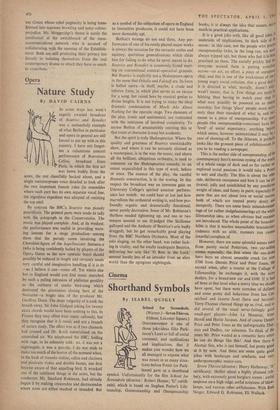Opera
Nature Study
By DAVID CAIRNS
By contrast the BBC's Beatrice was piously punctilious. The printed parts were made to tally with the autograph in the Conservatoire. The music was played complete. And, at its weakest, the performance was useful in providing warn- ing lessons for a stage production—among them that the parody scene involving the Cherubini-figure of the kapellmeister Somaro, c (who is being confidently hailed by players of the Opera Game as the new operatic bore) should possibly be reduced in length and certainly needs very careful and imaginative handling if it is to —as 1 believe it can—conic off. Yet where else but in England would you find music smirched by such a puling intrusion of philistine gentility as the outburst of studio bird-song which destroyed the pianissimo closing bars of the Nocturne—a bright idea of the producer Mr. Geoffrey Dunn. The sheer vulgarity of it took the breath away. Sir John Gielgud asking for twenty extra chords would have been nothing to this. In France they may often treat music callously, but they recognise that it is music and not a branch of nature study. The effect was as if two channels had crossed and Dr. Koch materialised on the astonished air. We telephoned the BBC, boiling with rage, to be solemnly told: no, it was not a nightingale, it was a piccolo. I do not wish to make too much of the horror of the moment when, in the hush of tremolo violins, cellos and clarinets and pizzicato violas and double basses, one first became aware of that appalling bird. It wrecked one of the sublimest things in the score, but the conductor, Mr. Stanford Robinson, had already begun it by making crescendos and decrescendos where none are either marked or intended. But as a symbol of the subjection of opera in England to insensitive producers, it could not have been more damnably apt.
Berlioz's wrongs do not end there. Any per- formance of one of his rarely played major works is always the occasion for the sarcastic smiles and squirmy, querulous generalisations which chide him for failing to do what he never meant to do. Beatrice and Benedict is commonly found want- ing on conventional comical-operatical grounds. But Beatrice is explicitly not a Shakespeare opera in the sense that Othello and Falstaff are. Its form is ballad opera—in itself, maybe, a crude and inferior form, in which plot serves as an excuse for a song, but raised here by musical genius to divine heights. It is not trying to make the ideal dramatic condensation of Much Ado About Nothing for the operatic stage. Two elements of the play, ironic and sentimental, are contrasted with the minimum of involved complexity. To accuse Berlioz of amateurishly omitting this or that event or character is easy but academic.
But the spirit is truly Shakespearian. Where the quality and greatness of Beatrice unmistakably show, and where it can be seriously claimed as a masterpiece, is in the way the music, and above all the brilliant, ubiquitous orchestra, is used to comment on the Shakespearian comedy, to an extent unparalleled in this type of work, before or since. The essence of the play, the careful dramatic construction, is in the scoring. In this respect the broadcast was an immense gain on University College's spirited amateur perform- ance last month: we could hear at last just how marvellous the orchestral writing is, and how pro- foundly organic and dramatically functional, never purely decorative. Some of Mr. Robinson's rhythms needed tightening up, and one or two tempos seemed to me ill-judged (the Sicilienne galloped and the Andante of Beatrice's aria badly dragged), but he got remarkably good playing from the BBC Northern Orchestra. Most of the solo singing, on the other hand, was rather lack- ing in vitality, and the totally inadequate Beatrice, delivering her aria like '0 Rest in the Lord,' seemed hardly less of an intruder from an alien world than the egregious nightingale.


































 Previous page
Previous page